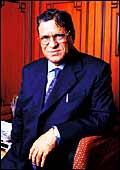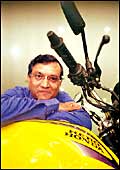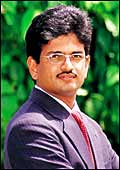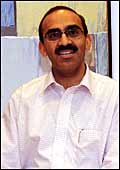 |
"The CFO is in
the best position to know the strength of the organisation.
It is up to him to set benchmarks and determine the company's
unique positioning and strength, or weakness"
Praveen P. Kadle
Executive Director (Finance & Corporate Affairs)/Tata
Motors |
Two large LCD
monitors behind his head flash the latest stock prices and index
values. His table is brimming with research papers, which detail
the status of and the prospects for the Indian economy and the
two-wheeler industry, including product launches, market shares
and technology. Proposals from various local governments making
a case for his company to set up its third manufacturing plant
in their respective states also adorn the desk. You might have
guessed the company by now: Yes, it's Hero Honda Motors, India's
#1 motorcycle company. But whose office could this be: If you
had to choose between CEO, head of marketing and head of finance,
you'd more likely opt for either one of the first two mentioned.
It couldn't be head of finance-after all, his task is just to
tally numbers, and not to take major decisions on plant locations
or to negotiate with state governments, right?
Wrong. Let the man himself, Ravi Sud, Vice
President (Finance), Hero Honda Motors, dispel any antiquated
notions you harboured about beancounting, scorekeeping financial
controllers. "We aren't just number crunchers any more; the
role of the finance head has evolved tremendously. I have to get
involved in every major decision the company makes because there
is a cost issue involved, be it marketing or product launches.
It is my job to advise the company about the financial implications
of decisions," explains Sud.
FROM BEANCOUNTER TO STRATEGIST
How the CFO's role has changed. |
»
He (along with his team) is at the forefront of
M&A activity, often conceiving and concluding transactions
without investment bankers
» Tighter
domestic regulations coupled with international listings are
compelling him to focus on transparency and stronger disclosure
norms
» He is
the bridge between the board of directors and investors, and
often the public face of the company
» He has
to raise funds (both domestically and internationally) and
allocate capital efficiently to different business units,
and for various business initiatives. Whilst he's at this,
he's got to ensure that debt is at manageable levels
» He's
also responsible for the company's risk mitigation policy |
To be sure, the rechristening of finance chiefs
to the rather officious title of CFO isn't a superficial change.
If yesterday he was a mere accountant or auditor, supporting the
decision-making CEO, today the CFO is the one making the decisions,
blueprinting strategy, conceiving and concluding mergers and acquisitions
(M&As), managing risk, building bridges with investors and
focussing on raising cost-effective capital, both domestic and
international. "With relatively less capital competing among
different businesses, the CFO becomes pivotal in ensuring that
the capital comes to his company or bank as the case may be,"
says N.S. Kannan, CFO and Treasurer, ICICI Bank. Besides, he also
has to ensure that resource allocation among different business
units is done profitably so as to ensure optimal returns for the
company.
 |
 |
"We
would tend to attach a lot of emotions to the business, but
we have to learn to be detached if we want to move forward...
(yet) we don't hive off or retain businesses for the
heck of it"
D.D. Rathi
Whole Time Director and CFO/ Grasim Industries
|
"We
aren't just number-crunchers any more... I have to get involved
in every major decision the company makes because there is
a cost issue involved"
Ravi Sud
Vice President (Finance)/ Hero Honda Motors |
"The CFO is in the best position to know
the strength of the organisation. It is up to him to set benchmarks
and determine what is the company's unique positioning and strength-or
weakness-and then leverage that. He is the most active player
in improving the profitability of the company," says Praveen
P. Kadle, Executive Director (Finance & Corporate Affairs)
for Tata Motors. Kadle would know. Over the last four years, he
has been at the forefront of the spectacular turnaround at Tata
Motors, from a company saddled with losses of Rs 500 crore in
2001 to one that is debt free today and has enough cash surplus
to launch new products (cars, trucks and buses). The strategy
of Kadle and his core team revolved around getting Tata Motors
back in black in the first two years, and then growing it over
the next three. So far, he is bang on target.
At Tata Motors-as at most of India Inc. that
matters-inorganic growth via cross-border M&A has also become
a mantra. There have been two major acquisitions over the last
15 months (Daewoo Commercial Vehicles Company in Korea, and a
minority stake in Hispano Bus Company, which may eventually be
converted into a Tata Motors subsidiary). In both cases, the finance
team played a crucial role, right from the initial analysis as
to how the acquisitions would be profitable for the company, to
the due diligence and negotiations. Post acquisition too, it's
up to the CFO to make sure that the integration process passes
smoothly. At Gujarat Ambuja Cements, ed Anil Singhvi was involved
in the recent $800-million (Rs 3,520-crore) transaction with Swiss
cement giant Holcim from start to end, and remarkably he concluded
the deal without any assistance from investment bankers. Small
wonder then that Singhvi remarks: "The CFO today has transformed
into one who is setting the rules of the game."
 |
 |
"With several
of the organisation's business units competing for capital,
the role of the CFO becomes pivotal in ensuring that capital
gets allocated in the most optimal manner across business
units"
N.S. Kannan
CFO and Treasurer/ ICICI Bank |
"The CFO
is now setting the rules of the game... (but) though the responsibilities
have increased, so have the risks. If you cut corners, you
are more exposed than the CEO"
Anil Singhvi
Executive Director/ Gujarat Ambuja Cements |
The bottom line of course is that all such
activity should result in value creation, and that goal may call
for significant amounts of restructuring, and divestments. D.D.
Rathi, Whole Time Director and CFO, Grasim Industries, knows what
he is talking about when he says it's up to the finance head to
maintain cost competitiveness and profitability. From a diverse
conglomerate, Grasim today has come to be focussed on cement and
fibre-an exercise that involved some heavy-duty debt restructuring
and hiving off of unprofitable units. "We tend to attach
a lot of emotions to the business, but we have to learn to be
detached if we want to move forward," advises Rathi. Moving
forward for Rathi also means acquisitions; he was one of the key
Grasim personnel at the core of the takeover of L&T's cement
business, now christened UltraTech Cement. Yet, the Grasim CFO
is acutely aware of many head honchos' temptation to overdo M&As,
perhaps lured by the glamour and driven by ego. "We don't
hive off or retain businesses just for the heck of it," he
says.
Another word of caution: While the CFO is
at the forefront of many decisions, recent global corporate scandals
have resulted in the spotlight being trained directly on the CFO
to ensure that information released by him is indeed correct.
Once Clause 49 comes into effect-a clause in the listing agreement
of stock exchanges that lays down stringent provisions of corporate
governance for listed companies-the CFO will be required to sign
the balance sheet along with the CEO. "It cuts both ways,"
states Singhvi. "Though the responsibilities have increased,
so have the risks. If you cut corners, you are more exposed than
the CEO."
-additional reporting by
Kushan Mitra
|








